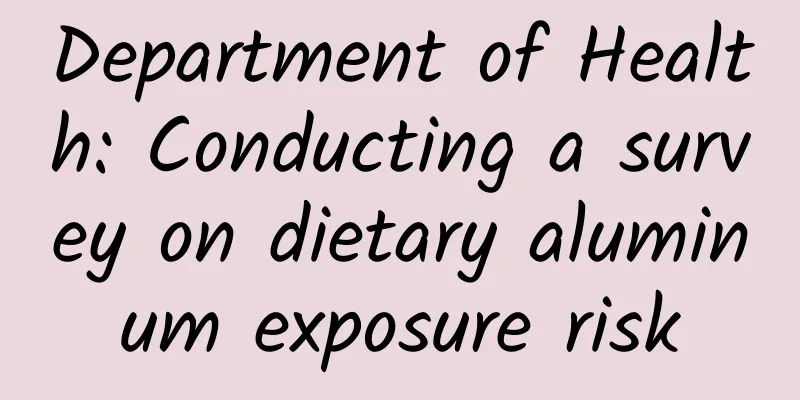Department of Health: Conducting a survey on dietary aluminum exposure risk

|
In response to the news released by the Consumer Protection Foundation that "67% of donuts, fried dough sticks, steamed buns, kelp and vermicelli contain aluminum, which is a killer of intelligence", the Food and Drug Administration of the Department of Health reiterated today on the 7th that in order to promote the policy of safe food, it has launched a one-year survey project on the exposure risk of aluminum intake in the diet of the Chinese people. The Food and Drug Administration of the Department of Health will revise food additive standards in a timely manner based on risk assessment results to align with international standards, and recommend that businesses adopt low-aluminum or aluminum-free formulas to protect the health of the people. The Food and Drug Administration of the Department of Health once again stated that in order to promote the policy of safe food, it has launched a survey project on the exposure risk of aluminum intake by the Taiwanese population in their diet. (Photography by Luo Huiwen) The Food and Drug Administration of the Department of Health has carried out the "Survey on the Risk of Aluminum Exposure to the Diet of the Taiwanese Public" this year, compiling international regulations and safety data on the use of aluminum-containing food additives, and also conducting an exposure risk assessment of aluminum intake from the diet of the Taiwanese public and evaluating the appropriateness of the relevant regulations on the use of aluminum-containing food additives in Taiwan. At the same time, it will also design consumer promotion materials and aluminum-free recipes, and hold industry briefings to promote them. The results of the relevant projects will be included as an important reference for subsequent policies to protect the health of the Taiwanese public. According to the "Scope, Limits and Specifications of Food Additives" set by the Department of Health, there are currently 7 types of aluminum-containing leavening agents and 2 types of aluminum-containing quality improvers that are permitted food additives. International regulations on aluminum-containing food additives vary. The United Nations Food Codex Committee (Codex) sets a usage limit of 30~30,000 mg/kg for some aluminum-containing food additives (such as the upper limit of aluminum silicate in dairy products is 10,000 mg/kg), while some other additives have no usage limit. The United States and Japan have no usage limit, the European Union limits the aluminum content in sponge cakes to 1,000 mg/kg, and mainland China sets the aluminum residue in products to below 100 mg/kg. After the Joint Expert Committee on Food Additives (JECFA) of the Food and Agriculture Organization of the United Nations and the World Health Organization temporarily revised the tolerable weekly intake (PTWI) of aluminum to 2 mg per kilogram of body weight per person in 2011, the Codex Alimentarius Commission is currently considering whether to revise the standards for the use of aluminum-containing food additives. The European Food Safety Agency (EFSA) has set a provisional allowable weekly intake of 1 mg. In addition, whether aluminum causes Alzheimer's disease remains inconclusive based on existing scientific research. The Food and Drug Administration of the Department of Health reminds consumers that good eating habits are the foundation of health. It encourages people to consume a balanced diet, exercise appropriately to maintain a normal weight, drink plenty of water, consume more natural fruits and vegetables, and reduce the intake of refined processed foods to ensure good health and stay away from the risk of disease. |
<<: Too high aluminum content! Fried dough sticks may be a killer of intelligence
>>: Eat with peace of mind! Department of Health PaPaGo holds briefing
Recommend
How harmful are irregular menstruation?
How harmful are irregular menstruation in girls? ...
It’s freezing cold in winter, is your brain tied up and shutting down? Coffee is not the only thing that can help you stay alert. Here are three tips to protect your brain and prevent your memory from getting stuck.
It’s chilly in winter. Do you feel cold hands and...
Say no to stiffness and soreness! Stretching your muscles is better than weight training
Why does sitting for too long and not moving enou...
Brief description: Several common symptoms of acute cervicitis
Acute cervicitis is a gynecological disease with ...
How much do you know about the precautions for treating cervical hypertrophy?
It is very important for patients to understand a...
How to regulate the pelvic fluid to drain out
Most pelvic effusions can only be eliminated by f...
How can an ectopic pregnancy be detected?
Ectopic pregnancy is a highly harmful gynecologic...
What is the reason for irregular menstruation and fear of cold?
What is the reason for irregular menstruation and...
Can women eat ginger after miscarriage? It is not recommended to eat spicy food
Women are great people, because they shoulder the...
What are the more effective preventive measures for vaginitis?
Vaginitis is very harmful to women. Many people i...
How to use medicine correctly for ovarian cysts
How to use medicine correctly for ovarian cysts? ...
Eventually leading to infertility, women also have the hidden danger of "inflammation"
Many gynecological diseases can cause cervical er...
Can I have a smooth birth after getting pregnant with uterine fibroids?
The uterus is an important place for women to get...
Where does pelvic inflammatory disease hurt?
There are acute and chronic pelvic inflammatory d...
Women should keep warm and clean after abortion
There are two care measures that women should pay...









